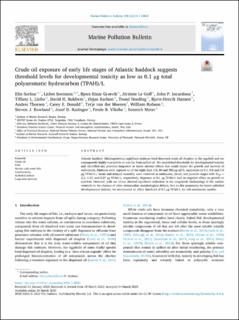Crude oil exposure of early life stages of Atlantic haddock suggests threshold levels for developmental toxicity as low as 0.1 μg total polyaromatic hydrocarbon (TPAH)/L
Sørhus, Elin; Sørensen, Lisbet; Grøsvik, Bjørn Einar; Le Goff, Jérémie; Incardona, John P.; Linbo, Tiffany; Baldwin, David; Karlsen, Ørjan; Nordtug, Trond; Hansen, Bjørn Henrik; Thorsen, Anders; Donald, Carey; van der Meeren, Terje; Robson, William; Rowland, Steven J.; Rasinger, Josef; Vikebø, Frode Bendiksen; Meier, Sonnich
Peer reviewed, Journal article
Published version
Date
2023Metadata
Show full item recordCollections
- Articles [3012]
- Publikasjoner fra CRIStin [3066]
Abstract
Atlantic haddock (Melanogrammus aeglefinus) embryos bind dispersed crude oil droplets to the eggshell and are consequently highly susceptible to toxicity from spilled oil. We established thresholds for developmental toxicity and identified any potential long-term or latent adverse effects that could impair the growth and survival of individuals. Embryos were exposed to oil for eight days (10, 80 and 300 μg oil/L, equivalent to 0.1, 0.8 and 3.0 μg TPAH/L). Acute and delayed mortality were observed at embryonic, larval, and juvenile stages with IC50 = 2.2, 0.39, and 0.27 μg TPAH/L, respectively. Exposure to 0.1 μg TPAH/L had no negative effect on growth or survival. However, yolk sac larvae showed significant reduction in the outgrowth (ballooning) of the cardiac ventricle in the absence of other extracardiac morphological defects. Due to this propensity for latent sublethal developmental toxicity, we recommend an effect threshold of 0.1 μg TPAH/L for risk assessment models.
